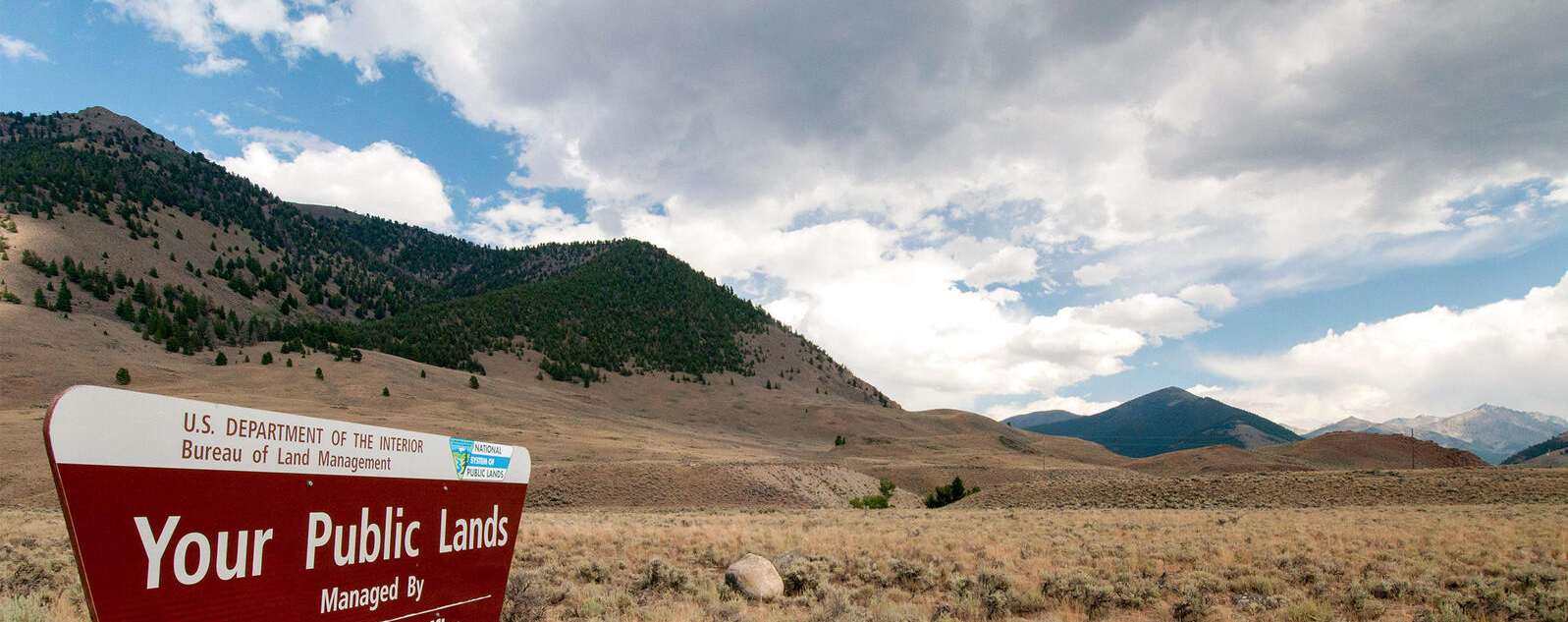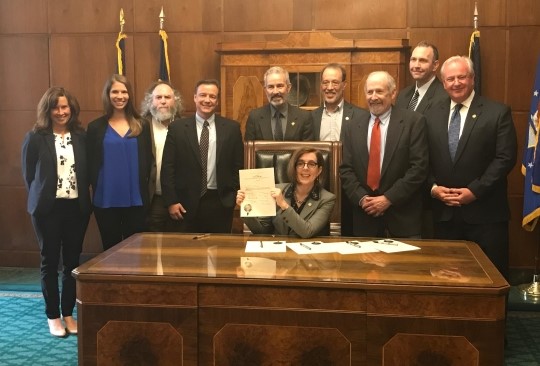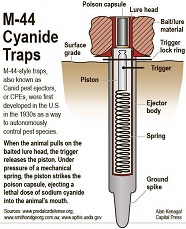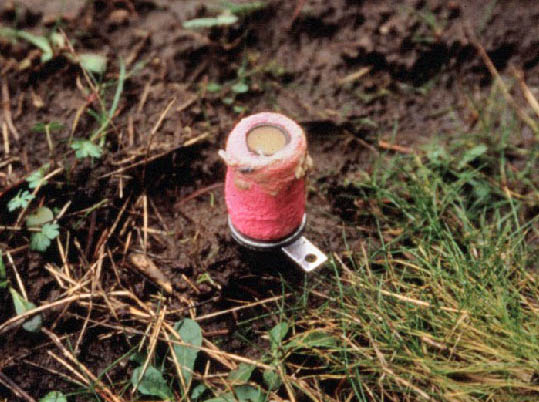Help Us Fully Ban M-44 "Cyanide Bombs"
Will it take the death of a child to fully ban M-44s, the indiscriminate poison land mines lurking in our great outdoors in at least 10 states? We fear it might. These cyanide-dispersing devices used by government agents to kill livestock predators have already poisoned people and killed countless dogs and nontarget wildlife. M-44s cannot be used safely, which makes them a public safety menace. We have initiated and led national and state-level efforts to ban them since 1990, and significant progress is being made.
VICTORY SPOTLIGHT: "Cyanide Bombs" Banned on 245 Million Acres of Public Lands!
We were thrilled to announce on Nov. 22, 2023 that the U.S. Interior Department has banned the use of M-44 devices, commonly known as "cyanide bombs," on lands administered by the Bureau of Land Managment (BLM). This includes over 245 million acres, roughly a tenth of the nation's land mass. It means countless thousands of wild animals will not be killed on BLM lands, including endangered species. It also means people can feel free to walk their dogs on these public lands and not risk death or poisoning. This win is historic. It can and should lead to bans on all public lands, and ultimately a ban on all M-44 devices. Our work continues to this end.
Key Happenings:
- Huffman, Cohen, Merkley call on Forest Service to ban cyanide bombs on public lands - Press release, March 12, 2024
- Congressional letter urges USDA Secretary Tom Vilack and USFS Chief Randy Moore to ban M-44s - March 12, 2024
- Former Wildlife Services supervisor speaks out against M-44 use, details why trappers don't want to use them - Jan. 6, 2024
- M-44s banned on 245 million acres of public lands by U.S. Dept. of the Interior - Nov. 22, 2023
- Canyon's Law - Two bills to ban M-44s on public lands, introduced in 2023 Congress
- 70+ conservation groups join petition to Dept. of Interior to ban "cyanide bombs" on BLM lands
- Dept. of Interior appears open to ban on BLM lands
- Oregon bans M-44s statewide
- Idaho bans use of M-44s, pending full EIS
- Pocatello family prevails in lawsuit against USDA Wildlife Services
- How you can help
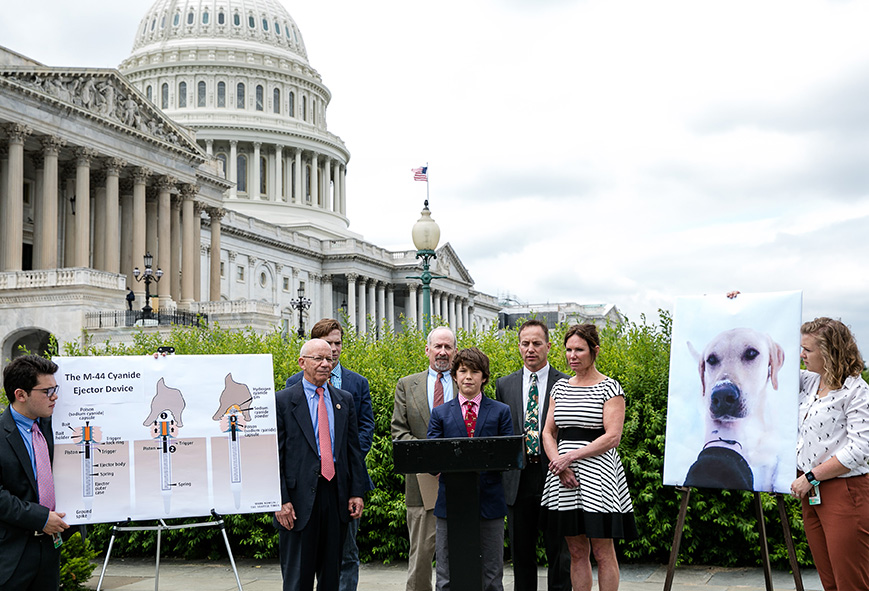
Press conference from one of our trips to the U.S. Capitol with the Mansfield family of Pocatello, ID, urging passage of Canyon's Law, a federal bill to ban M-44 'cyanide bombs.' Photo credit: Jenifer Morris Photography
Overview
In our decades-long work toward a nationwide ban on deadly M-44 cyanide devices (aka "cyanide bombs"), a turning point occured when we traveled to Washington, D.C., with the Mansfield family of Pocatello, Idaho (pictured above). The Mansfields lost their dog, and almost their son, Canyon, on March 16, 2017, to an M-44 device set on a hill behind their back yard. Due to the shocking reality of their experience, and their determination to not just be victims but to create change, the Mansfield's were very effective in our 2017 and 2019 trips to urge members of Congress to wake up to the need for federal legislation.
As of June 2023 M-44s are confirmed as still being used by the government for predator control in 10 states. They are allowed statewide in Colorado, Montana, Nebraska, Nevada, New Mexico, North Dakota, Oklahoma, Texas, West Virginia and Wyoming. The EPA also authorizes M-44 use by state agencies in Montana, New Mexico, South Dakota, Texas, and Wyoming. We continue to work toward a nationwide ban, while also pushing ahead on a state and local level to encourage local jurisdictions to lead the way. Progress is being made, as detailed below.
Canyon's Law - Two Bills to Ban M-44s on Public Lands Introduced in Congress
June 2023 - We're pleased to announce that two bills to ban M-44s on all public lands were introduced in Congress on June 13, 2023. Nicknamed "Canyon's Law" in honor of Canyon Mansfield, these common-sense, tax-saving, nonpartisan bills should be supported without resistance as an essential public safety measure by all elected officials. Read our press release | Help get these bills passed
U.S. House Bill
- H.R. 4068 - Canyon's Law - 118th Congress. Introduced by Rep. Jared Huffmann (D-Calif.) and Rep. Steve Cohen (D-Tenn.) on June 13, 2023. Track bill progress on Congress.gov | Read Congressional press release
U.S. Senate Bill
- S. 1940 - Canyon's Law - 118th Congress. Introduced by Sen. Jeff Merkley (D-Oreg.) on June 13, 2023. Track bill progress on Congress.gov | Read Congressional press release
Pushing for Public Lands Bans, Regardless of Federal Bill Status
We've long worked towards public lands bans, regardless of the status of federal legislation. One of the most exciting developments happened during a House Subcommittee hearing on Canyon's Law held July 21, 2022 before House Natural Resources Subcommittee on Water, Oceans and Wildlife (WOW). Part of the testimony for the hearing included a statement from the Dept. of the Interior indicating they were open to the ban of M-44s on lands they control. We were thrilled to see this and worked to leverage it by calling for a ban on BLM lands. Here are key hearing links:
- Watch House WOW Subcommittee hearing
- Read statement from Dept. of the Interior
- Read our testimonial letter, detailing years of M-44 incidents
- Read Dr. Mark Mansfield's testimony
- Watch Dr. Mark Mansfield's testimony
On Oct. 6, 2022 Rep. Peter DeFazio (D-Oreg) and Committee Chair Jared Huffman (D-Cal) followed up with a letter to Interior Secretary Deb Haaland requesting a ban on M-44s on lands they control (Bureau of Land Management), regardless of the status of Canyon's Law. On June 29, 2023 over 70 conservation groups joined us in urging the Interior Department to ban cyanide bombs on public lands. Press release | Official APA petition
Nov. 22, 2023 Victory! - Interior Department bans M-44s on 245 million acres of public lands, all lands managed by BLM. Our press release | Rep. Jared Huffman's press release
On the state level bans on M-44 use on public lands happened temporarily in Colorado and Texas. Colorado banned use of M-44s on public lands in 2017, pending further study, and Wyoming banned M-44s on 10 million acres public lands in 2019, pending results of a lawsuit against USDA Wildlife Services which required a new EIS. Unfortunately, these temporary state bans did not stick.
Our work continues. M-44 use is utterly unacceptable. And we will not back down.
How You Can Help: Key Actions to Fully Ban M-44s on Public Lands
SUPPORT CANYON'S LAW: A key way you can help ban M-44 "cyanide bombs" on all public lands--federal, state and local--is to send a short message urging your U.S. Senators and Representatives to support Canyon's Law, so nicknamed in honor of Canyon Mansfield. You can say something as simple as [copy/paste]:
"Please support Canyon's Law, [insert bill H.B. 4068 or S. 1940 here], the bill to ban M-44 "cyanide bombs" on public lands. M-44 devices are used by wildlife agents for predator control, but they are scientifically shown to be counter-productive. They can also never be used safely, as they are indiscriminate killers whose victims include endangered species, wildlife, and pets--none of which can read warning signs. People have been severely injured by M-44s and it is only a matter of time before a child is killed. Canyon's Law is common-sense, tax-saving, nonpartisan legislation deserving support as an essential public safety measure by all elected officials."
OTHER WAYS TO HELP: In addition to contacting key government leaders, we encourage you to share this webpage and spread the word to everyone you know who cares about pets, kids, wildlife, and safety in the great outdoors, urging them to take the same actions.
You can also further our efforts by making a donation to support our work, which includes raising public awareness, coordinating campaigns with other interested environmental and animal welfare organizations, and educating elected officials on why M-44s are a public safety menace and banning them is a nonpartisan issue. Any donation amount helps and is greatly appreciated. DONATE TODAY
SPOTLIGHT: Idaho bans use of M-44s, pending full EIS; Mansfield family wins precedent-setting legal battle
After a long, high profile fight, we're pleased to announce a strikingly good court decision in March 2020 banned M-44s statewide in Idaho. It's a win for a great outdoors free of "cyanide bombs" and we are proud to have been a plaintiff in this landmark case. The decision locks in Idaho's tentative moratorium on M-44s, until the agency completes a full Environmental Impact Statement (EIS), which will take a minimum of four years, and is unlikely to happen.
- Idaho Court restricts wolf-killing, bans use of M-44 cyanide bombs - Idaho State Journal, Mar. 12, 2020
August 2020 brought another big Idaho win via the Mansfield family's lawsuit against USDA Wildlife Services. Their case--arising from the 2017 wrongful killing of their dog Kasey and poisoning/potential killing of their son Canyon with an illegally placed M-44 on a hill behind their home--was about principle, not money. Due to their perseverance and determination, the Mansfield family achieved a first--they prevailed in holding the government accountable for one of countless incidents in which indiscriminate, poisonous land mines, planted in our great outdoors for "predator control," have killed wild animals, dogs, and potentially a child. Wildlife Services admitted it was negligent. This sets a very important precedent indeed.
- U.S. government agrees to pay local family $38,500 in lawsuit over illegally placed M-44 'cyanide bomb' - Idaho State Journal, Aug. 10, 2020
- Learn more about the Mansfield family's M-44 tragedy
SPOTLIGHT: Oregon's statewide M-44 ban went into effect in 2020
We're thrilled to report that our rigorous coordination of testimony by victims and experts to Oregon legislative committees truly paid off. In April 2019 they almost unanimously passed SB 580, a bill which banned M-44s statewide. The bill was signed into law by Gov. Kate Brown on May 6, 2019, and went into effect on Jan. 1, 2020.
So Oregon has joined neighboring states Washington and California to create a West Coast free of M-44 devices!
- 'Cyanide bombs' now banned in Oregon - KLCC, Jan. 1, 2020
- Oregon outlaws use of so-called ‘cyanide bombs’ as advocates move to take ban nationwide - The Oregonian, May 8, 2019
- Oregon has banned M-44 "cyanide bombs" - Predator Defense press release, May 6, 2019
- Our director's testimony to Oregon Senate Committee in support of ban
- Testimony of Amanda Kinglsey, who lost her dog Ruby in 1994, kick-starting our work to ban M-44s
- All testimony in support of SB 580
Background on Hard-Fought Oregon Win
This great news from Oregon follows a long (multi-decade) slog. It came to a head after we urgently petitioned wildlife directors via a detailed 16-page letter to address this critical public safety issue and they denied our request.
The letter was signed by close to 100 victims/survivors, physicians, veterinarians, scientists and other affected parties. All who signed had learned from personal experience and/or observation that there is no safe place or way to use M-44s, as kids, pets and wild animals do not understand warning signs. The letter was exhaustively referenced, details over 60 incidents of human and pet poisonings since 1990, and shows the government's yearly under-reported statistics on dog deaths.
- Press release announcing our Oregon petition to eliminate M-44s
- Our detailed letter to Oregon and Western Region directors
- Letter from Rep. Peter DeFazio (D-Oreg) to Oregon Gov. Kate Brown
In denying our request Oregon wildlife directors unsuprisingly hid behind flawed safety regulations their own agents don't even follow. They also ignored our most pertinent points. We were absolutely fed up and continued our push toward a ban.
We testified twice in 2019 at public hearings before Oregon legislative committees in support of SB 580, the bill to ban M-44 devices across the state that eventually passed. We rallied victims to testify before the Senate Committee on Environment and Natural Resources on February 28 and before the House Committee on Natural Resources on April 11. The victims' heartfelt testimonies were powerful, as was our director's testimony and our extensively referenced letter to Committee members signed by 15 environmental and conservation orgs.
SB 580 passed the Oregon legislature almost unanimously on April 25, 2019, with a Senate vote of 25-3 and a House vote of 53-6. The bill was signed by Governor Brown on May 6, 2019, and went into effect Jan. 1, 2020.
What Are M-44 "Cyanide Bombs"?M-44 devices--commonly called "cyanide bombs" or "coyote getters"--are spring-activated sodium cyanide ejectors that deliver a deadly dose of the poison when triggered. While these devices are not technically bombs, because no explosives are used, they shoot a cloud of cyanide powder up to five feet in the air, which is how they earned their nickname. An M-44 victim can die within minutes or linger over a long period of time, depending on the dosage received. M-44 fact sheet
To set up an M-44, a small pipe is driven into the ground and loaded with an ejector and a sodium cyanide capsule. The top of the ejector is wrapped with an absorbent material coated with scented bait to attract animals. When an animal pulls on this material, a spring ejects the sodium cyanide into their mouth and face.
M-44s are intended to kill coyotes, but they are indiscriminate. They have killed countless dogs and wild animals (including endangered species). They have also harmed a number of humans, even contributing to one man's death. View death certificate | Read featured incidents of pet killings and human poisonings caused by M-44s
Early Efforts to Ban M-44s
We have been pressing for a national ban on M-44s since 1994 when a woman named Amanda Wood-Kingsley contacted us for help after she and her dog Ruby were poisoned by an M-44. From that point forward we met an increasing number of victims and started working intensively with former Congressman Peter DeFazio’s (D-Oreg.) to develop a bipartisan bill to ban M-44s across the nation. It was introduced in Congress in March 2017 and reintroduced in 2019. A version of the bill modified to ban M-44s on public lands was first introduced in 2021. This work has since continued via other Members of Congress. See current legislation
Peter DeFazio was acutely aware of the threat that M-44’s pose to pets, people, and wildlife, as we consistently relayed personal accounts to him of poisonings that occured across the country. He cared deeply about this issue and we owe him a debt of gratitude. See Retirement Tribute to U.S. Representative Peter DeFazio
Victims of M-44s have strongly supported our efforts to ban these devices nationwide, as evidenced by the letters and report below, which provide dramatic testimony of the horrific consequences of M-44 use.
M-44 Incidents and Victims

Since 1990 we've been helping M-44 "cyanide bomb" victims cope with the trauma of losing a pet to poisoning and/or being poisoned themselves, deal with their local law enforcement, and push to get the federal government to stop using these indiscriminate devices.
- Featured incidents of M-44 pet killings and human poisonings, 1990-2018
- Letters from M-44 victims
- Slide show featuring M-44 victims
In 2017 two particular M-44 cases in Wyoming and Idaho caused considerable stir and provided new momentum for banning these indiscriminate menaces to public safety and animal welfare.
2017 WYOMING INCIDENT: Two Dogs Killed While Family Out for Walk on Prairie
In March 2017 we began working with a family in Wyoming who went out for a beautiful pre-spring walk on the prairie--one they'd taken many times before--and lost two dogs in horrifying circumstances. Our executive director, Brooks Fahy, minced no words when interviewed about this case in The Oregonian, saying "M-44s are really nothing more than land mines waiting to go off, no matter if it's a child, a dog, or a wolf. It's time to ban these notoriously dangerous devices on all lands across the United States." Read full article
2017 IDAHO INCIDENT: Teen Narrowly Escapes Death after Triggering Device that Kills His Dog; Family Becomes Activists against M-44s
We began working extensively with the Mansfield family of Pocatello, Idaho after their 14-year-old son Canyon accidentally set off an M-44 on a hill behind his back yard on March 16, 2017 and watched helplessly as his dog died an excruciating death.
Canyon only missed death by poisoning himself because of wind direction. He had to be hospitalized, suffered severe side effects, and has been closely monitored. The Mansfield family was devastated and outraged, so much so that they committed themselves to preventing this from happening to anyone else.
Meet the Mansfield family | Read Canyon's first-hand account, "My Best Friend, Kasey" | Read news coverage
On March 28, 2017, we joined a coalition of environmental and wildlife groups asking for an immediate ban on M-44s in Idaho and removal of all existing devices in the state. Idaho finally agreed to a temporary moratorium that remains in effect as of Jan. 1, 2020:
- Press release on request for immediate ban M-44s in Idaho
- Letter petitioning Idaho director of USDA Wildlife Services to ban M-44s
- Response from Idaho director agreeing to temporary ban on M-44s
In 2017 and 2019 the Mansfields traveled with us to Washington, D.C. to urge members of Congress to ban M-44s. Read story Canyon's father, Dr. Mark Mansfield, spoke out in an impassioned and well-informed commentary in the Idaho State Journal. The family also attended a public meeting in Pocatello and spoke out strongly to representatives of the government agency involved, USDA Wildlife Services, letting them know that there is no safe way to use M-44s and that they should be banned.
In March 2018 the Mansfields joined us at a special screening of our award-winning fim EXPOSED: USDA's Secret War on Wildlife in Pocatello. The event commemorated the one-year anniversary of losing their dog Kasey, their son's harrowing poisoning, and their ongoing advocacy for reform and received in-depth media attention:
- Mansfield family talks progress one year after cyanide bomb explodes near backyard - ABC/LocalNews8, Mar. 15, 2018
- Family dog's cyanide death highlights obscure government tool - The Oregonian, Mar. 15, 2018
- M-44 SURVIVOR: One year later, Pocatello teen still haunted by 'cyanide bomb' blast - Idaho State Journal, Mar. 14, 2018
In 2018 the Mansfields filed a lawsuit against the U.S. government, asking to be fairly compensated for their pain and suffering and for the debilitating trauma, headaches and nausea their son has experienced. In its initial response to the lawsuit, the government had the audacity to ask that the case be dismissed and blamed the Mansfields for the incident. This was beyond outrageous. The articles below show how events initally unfolded. Subsequently, things took an interesting turn, so keep reading below:
- Federal agency blames the victim for Pocatello 'cyanide bomb' poisoning -Idaho State Journal, Aug. 25, 2018
- Idaho family says cyanide trap injured their son, killed their dog - CBS This Morning/CBS News, Aug. 24, 2018
- US government blames local boy and his family for 'cyanide bomb' detonation that injured him, killed his dog - Idaho State Journal, Aug. 23, 2018
August 2020 brought a wonderful turn for the Mansfields. Due to their perseverance and determination, they prevailed in their lawsuit against Wildlife Services. While they were awarded a small settlement, that was never the point. Their case was about principle, not money. What matters is the Mansfields achieved a first: they prevailed in holding the government accountable for one of countless incidents in which their indiscriminate, poisonous land mines have killed wild animals, dogs, and potentially a child. In settling this case, Wildlife Services admitted it was negligent. This sets a very important precedent indeed.
- U.S. government agrees to pay local family $38,500 in lawsuit over illegally placed M-44 'cyanide bomb' - Idaho State Journal, Aug. 10, 2020
The Mansfield family is featured, along with other M-44 victims we've helped over the years, in a heart-grabbing one-hour documentary called "Lethal Control" that was released in early 2019. It was made by a graduate student named Jamie Drysdale as his final project for a masters in environmental journalism.
- Fight to permanently outlaw M-44 'cyanide bombs' rages on with documentary film, local family's crusade - Idaho State Journal, Mar. 15, 2019
- 'Lethal Control' film details Wildlife Services' deadly use of M-44's - Idaho State Journal, Jan. 15, 2019
- About the film - meet filmmaker, watch trailer & more
In the years since the Pocatello tragedy, progress has been made toward state and national bans. In July 2022 a legal agreement extended the ban on M-44 use in Idaho through the end of 2024, pending Wildlife Services' completion of a new Environmental Impact Statement. Two bills that would ban M-44s on public lands across the country have been introduced in Congress. The legislation is nicknamed "Canyon's Law" in honor of Canyon Mansfield. A committee hearing on the House bill, H.R. 4951, was held on July 21, 2022, during which Dr. Mansfield provided expert testimony. Watch hearing testimony | Read hearing testimony | Current bill status
The Mansfield family, and our work to help them and other M-44 victims, were most recently featured in an in-depth article in The Intercept on July 27, 2023 - Secretive federal agency's days of killing pets with poison bombs may finally be ending.
OTHER INCIDENTS: Victims Speak Out in Letters to Congressman
The letters below were written by M-44 victims to Rep. Peter DeFazio (D-Oregon), requesting a complete ban on the deadly cyanide devices. The cases are strikingly different, but each had tragic results. Rep. DeFazio led the charge in Congresss for federal legislation to ban M-44s nationwide until his retirement in 2022.
- Dennis Slaugh's 2003 run-in with an M-44 & resulting death in 2018:
letter from Dennis | picture of Dennis | picture of M-44 | death certificate - Max's tragic death:
letter to Congressman from Max's owner | picture of Max | article in Salt Lake Tribune | Wildlife Services' contemptible denials (memo) - The poisoning of Amanda and her dog Ruby:
Amanda's 2007 letter to Congressman DeFazio | Amanda's 2019 House Committee testimony for bill that banned M-44s in Oregon | picture of Amanda and Ruby - Buddy's death...100 yards from home:
article about Buddy's tragic death | picture of Buddy | statement by Congressman Peter DeFazio about case - Utah hunter loses his dog Jenna in 90 seconds:
article about Jenna's tragic death - Texas rancher who survived blast supports bill to ban M-44s:
rancher's story - Danielle Claire's nightmarish loss of shepherd Oberon:
letter to Congressman urging ban on M-44s
M-44s in the News
- Ban on ‘cyanide bombs’ on US public lands celebrated as a win for wildlife - The Guardian, Nov. 29, 2023
- US agency ends use of ‘cyanide bomb’ to kill coyotes and other predators, citing safety concerns - Associated Press, Nov. 28, 2023
- M-44s banned on 245 million acres of public lands by U.S. Dept. of the Interior - Press release, Nov. 22, 2023
- Secretive federal agency's days of killing pets with poison bombs may finally be ending - The Intercept, July 27, 2023
- Conservation groups, federal lawmakers seek to end use of ‘cyanide bombs’ on public lands - NM Political Report, July 4, 2023
- Canyon's Law - Two Bills Introduced to Ban Deadly "Cyanide Bombs" on Public Lands - press release by Center for Biological Diversity in concert with Predator Defense, June 14, 2023
- Huffman, Cohen, Merkley Introduce Bill to Keep Families and Pets Safe from Hazardous Explosives - joint press release by U.S. Rep. Jared Huffman (D-Calif.), Rep. Steve Cohen (D-Tenn.), and Senator Jeff Merkley (D-Oreg.), June 13, 2023
- OR feds step up against cyanide devices on public land - two bills introduced in Congress by Senator and Representative from Oregon, The Corvalis Advocate, July 22, 2022
- IDAHO: Need for better science halts USDA carnivore killing - Ban on M-44s extended through end of 2024, Environment News Service, July 1, 2022
- Efforts to ban 'cyanide bombs' live on five years after local boy injured, pet killed - Idaho State Journal, Mar. 16, 2022
- U.S. government agrees to pay local family $38,500 in lawsuit over illegally placed M-44 'cyanide bomb' - Idaho State Journal, Aug. 10, 2020
- The secretive government agency planting 'cyanide bombs' across the US - The Guardian, June 26, 2020
- Idaho Court restricts wolf-killing, bans use of M-44 cyanide bombs - Idaho State Journal, March 12, 2020
- 'Cyanide bombs' now banned in Oregon - KLCC, Jan. 1, 2020
- Trump administration authorizes 'cyanide bombs' to kill predators again, months after backlash- TIME, Dec. 5, 2019
- EPA backtracks on use of ‘cyanide bombs’ to kill wild animals - The New York Times, Aug. 16, 2019
- Trump administration reverses decision to use 'cyanide bombs' to kill wild animals - The Guardian, Aug. 15, 2019
- EPA reauthorizes predator poison while Wyoming restricts use on public land - MTPR.org, Aug. 13, 2019
- EPA reauthorizes controversial 'cyanide bombs' for killing wild animals: 'A complete disaster' - Newsweek, Aug. 9, 2019
- Trump administration authorizes 'cyanide bombs' to kill wild animals - The Guardian, Aug. 8, 2019
- The government agency in charge of killing wild animals is facing backlash - Pacific Standard, June 24, 2019
- Fight to permanently outlaw M-44 'cyanide bombs' rages on with documentary film, local family's crusade - Idaho State Journal, May 15, 2019
- Oregon outlaws use of so-called ‘cyanide bombs’ as advocates move to take ban nationwide - The Oregonian, May 8, 2019
- DeFazio introduces ban on M-44s, aka 'cyanide bombs' - KLCC 89.7 NPR for Oregonians, May 2, 2019
- Time to end the use of M-44 cyanide bombs - Counterpunch, May 1, 2019
- Bill to ban cyanide traps is headed to governor's desk - KLCC 89.7, Apr. 26, 2019
- (Un)controlled Lethality: A screening of 'Lethal Control' at PIELC displays the dangers of cyanide devices - Eugene Weekly, Feb. 28, 2019
- 'Lethal Control': A film about the reckless use of M-44's - Psychology Today, Feb. 21, 2019
- 'Lethal Control' film details Wildlife Services' deadly use of M-44's - Idaho State Journal, Jan. 15, 2019
- EPA says it will not ban M-44 'cyanide bombs' - Idaho State Journal, Nov. 27, 2018
- US ‘cyanide bomb’ hurt child, killed dog, launched family crusade - Idaho Statesman, Sept. 15, 2018
- Advocates call on Oregon wildlife officials to ban use of controversial cyanide device - The Oregonian, Sept. 13, 2018
- Groups seek ban on M-44 'cyanide bombs' In Oregon - Oregon Public Broadcasting, Sept. 13, 2018
- Petition seeks Oregon ban on ‘cyanide bombs’ - Eugene Weekly, Sept. 13, 2018
- Federal agency blames the victim for Pocatello 'cyanide bomb' poisoning -Idaho State Journal, Aug. 25, 2018
- Idaho family says cyanide trap injured their son, killed their dog -CBS This Morning/CBS News, Aug. 24, 2018
- US government blames local boy and his family for 'cyanide bomb' detonation that injured him, killed his dog - Idaho State Journal, Aug. 23, 2018
- USDA’s reckless use of poisons must end - Washington Examiner, May 26, 2018
- Mansfield family talks progress one year after cyanide bomb explodes near backyard - ABC/LocalNews8, Mar. 15, 2018
- Family dog's cyanide death highlights obscure government tool - The Oregonian, Mar. 15, 2018
- M-44 SURVIVOR: One year later, Pocatello teen still haunted by 'cyanide bomb' blast - Idaho State Journal, Mar. 14, 2018
- Government agrees to halt use of cyanide traps in Colorado - Denver Post, Nov. 6, 2017
- Environmental groups petition EPA to ban cyanide devices linked to wolf death - The Oregonian, Aug. 10, 2017
- Opinion: It's time to outlaw 'cyanide bombs' - Idaho State Journal, Aug. 6, 2017
- Opinion: Aliens versus predators - Idaho State Journal, Aug. 3, 2017
- Wildlife Services fails to win any converts - Idaho State Journal, July 30, 2017
- Commentary: USDA Wildlife Services poisoned my son - Idaho State Journal, July 27, 2017
- Pocatello family works to ban use of cyanide bombs in the U.S. - LocalNews8.com, June 15, 2017
- Dog's death spotlights use of cyanide "bombs" to kill predators - National Geographic, Apr. 20, 2017
- USDA halts use of M-44 'cyanide bombs' in Idaho following death of family pet - FOX News, Apr. 11, 2017
- Feds ban Idaho cyanide bombs, still want Wyoming use - WyoFile, Apr. 11, 2017
- E. Oregon counties drop cyanide trap use: Wildlife agencies halt practice after gray wolf accidentally killed - Baker City Herald, Mar. 31, 2017
- Legislation introduced to ban use of cyanide for predator control - Idaho State Journal, Mar. 30, 2017
- Cyanide bomb kills two Casper dogs - WyoFile.com, Mar. 31, 2017
- Rein in wildlife agency - RegisterGuard editorial, Mar. 28, 2017
- Controversial bomb that killed dog a common tool in Utah, West - 'I feel like I've had terrorism in my backyard,' Pocatello mom says. Deseret News, Mar. 26, 2017
- THE NEW WEST: The Real Prey - Todd Wilkinson goes in-depth on how an Idaho boy almost became a casualty of the Western war waged on predators - Planet Jackson Hole, Mar. 22, 2017
- 'Cyanide Bomb' that killed dog, poisoned owner placed illegally by Wildlife Services - Fox 13, Mar. 21, 2017
- Family's dog was just killed by this tool — and the U.S. Government put it there - The Dodo, Mar. 21, 2017
- USDA must rethink cyanide bombs that injured boy, killed pets, lawmaker says - Fox News , Mar. 21, 2017
- Labrador killed by cyanide device in Idaho, boy knocked to the ground -
The Oregonian, Mar. 18, 2017 - 'Horrific incident': Family speaks out after pet dog killed by 'cyanide bomb' - Idaho State Journal, Mar. 17, 2017 (Article features video of 14 year-old boy who accidentally set off M-44 "cyanide bomb" that killed his dog.)
- Gov't agency issues statement after family dog killed by 'cyanide bomb' -
East Idaho News, Mar. 17, 2017 - Pocatello boy watches family dog die after 'cyanide bomb' explodes
-
Idaho State Journal, Mar. 16, 2017 - Feds kill wolf in Wallowa County on private land with cyanide trap -
The Oregonian, Mar. 2, 2017 - NE Oregon wolf poisoned by a trap set to kill coyotes -
Capital Press, Mar. 2, 2017 - Poison traps kill unintended victims - High Country News, March 13, 2000
- Tough Lesson: Pet owner learns hard way that SW Va. farmers are using cyanide coyote traps - Kingsport Times-News, May 17, 1999
Timeline of Progress to Date
November 2023 - M-44s banned on 245 million acres of public BLM lands by U.S. Dept. of the Interior. Press release
June 2023 - Bills to ban M-44s on all public lands introduced in U.S. House and Senate. Bill details | Press release
July 2022 - Bills to ban M-44s on all public lands considered by both houses of Congress. News story
July 2022 - Hearing on H.R. 4951 held by U.S. House Natural Resources Subcommittee on Water, Oceans and Wildlife. Details
July 2022 - Bill to ban M-44 "cyanide bombs" on public lands introduced in U.S. House by Rep. Peter DeFazio (D-Oreg) as H.R. 4951, aka "Canyon's Law."
July 2022 - Bill to ban M-44 "cyanide bombs" on public lands introduced in U.S. Senate by Sen. Jeff Markley (D-Oreg) as S. 4584, aka "Canyon's Law."
July 2022 - Settlement agreement from lawsuit we joined as plaintiffs extends ban on M-44 use in Idaho through end of 2024, pending Wildlife Services' completion of a new EIS. Details
August 2021 - Bill to ban M-44 "cyanide bombs" on public lands introduced in U.S. Congress by Rep. Peter DeFazio (D-Oreg) as H.R. 4951, aka "Canyon's Law."
August 2020 - The Mansfield family of Pocatello, ID, victims of illegally set M-44, prevail in lawsuit against USDA Wildlife Services, getting them to acknowedge their negligence. News story
March 2020 - Idaho bans M-44s, pending full Environmental Impact Statement (EIS). News story
January 2020 - Statewide ban on M-44s officially goes into effect in Oregon. News story
May 2019 - Oregon bans M-44s statewide via SB 580, a bill which passed the legislature almost unanimously. The Governor's signed the bill into law on May 6, 2019. It goes into effect on Jan. 1, 2020. Press release
May 2019 - Congressman Peter DeFazio (D-Oreg.) reintroduced legislation for nationwide ban on sodium cyanide used for predator control via the "Chemical Poisons Reduction Act of 2019," H.R. 2471, aka "Canyon's Law." Press release
September 2018 - Petitioned Oregon wildlife directors to eliminate M-44s statewide via a letter signed by almost 100 victims/survivors, physicians, veterinarians, scientists and other affected parties. Letter | Press release
August 2017 - Joined 17 other environmental groups in petitioning EPA for nationwide ban on M-44's. Petition | News story
November 2017 - Colorado bans M-44s on public lands, pending further study.
April 2017 - Idaho temporarily bans M-44 use statewide.
March 2017 - Legislation we've been working on to ban M-44 "cyanide bombs" nationwide was re-introduced in the U.S. House of Representatives on March 30, 2017 by Rep. Peter Defazio (D-Oreg.). Please find your Representative(s) and urge them to co-sponsor and/or support this bill. It is called H.R. 1817, "The Chemical Poisons Reduction Act of 2017." Then spread the word to every possible person.
March 2012 - Our legislation to eliminate M-44s for good was re-introduced in Congress. Details
June 2010 - Our legislation was introduced in Congress with bipartisan support. It stalled.
May 2010 - Published essay, "Two Killers that Need to Go," describing our efforts to date in our ongoing quest to ban M-44 devices, as well as the deadly poison, Compound 1080.
March 2010 - Released film, "Two Killers that Need to Go: The Case Against Poisoning Our Wildlife and Pets." It features interviews with two victims of M-44 poisoning.
May 2008 - Our first bill to ban M-44s was introduced in Congress.
January 2008 - Asserting a cover-up, we compelled the EPA to launch a formal investigation into human poisoning by an M-44, a device the USDA's Wildlife Services uses across the country:
- Read press release
- Men's Journal article - "America's Secret War on Wildlife: A federal agency keeps the West safe for cows by killing coyotes, wolves, bears--and pet dogs" - by Christopher Ketcham, January 2008
- The Salt Lake Tribune article - "EPA investigates Utahn's poisoning--4 years after device shot cyanide in his face" - by Patty Henetz, January 18, 2008
- Associated Press article - "Predator poison under review " - by Matthew Daly, January 21, 2008
- The Salt Lake Tribune editorial - "Sayonara cyanide: Poison land mines should be banned" - by Tribune editorial staff, January 22, 2008
- New bill introduced in Congress would eliminate M-44s
September 2007 - We suspected USDA Wildlife Services cover-up of human poisoning, demanded the EPA investigate, and called for an immediate moratorium on M-44s:
Federal M-44 Death Statistics & Use Guidelines
Death Statistics
NOTE: The deaths tallies included in the following reports sourced from USDA Wildlife Services data are highly suspect, particularly as employees within Wildlife Services have repeatedly told us many deaths are not reported.
- Wildlife killed by M-44s in 2020 - shows all wildlife reported as killed by M-44 devices, intentional and nonintentional
- M-44 domestic dog killings included in Wildlife Services' yearly summary statistics, 1997-2016
- M-44 wildlife and dog deaths reported by Wildlife Services, 2003-2014
Learn more about the coverup in EXPOSED, our award-winning, whistle-blowing film about America's secret war on wildlife.
Wildlife Services Warning Signs & Directives
Predator Defense investigations have repeatedly found a lack of warning signs on M-44s, despite the following federal directive on M-44 Device Use and Signage:
23. Bilingual warning signs in English and Spanish shall be used in all areas containing M-44 devices. All such signs shall be removed when M-44 devices are removed.
a. Main entrances or commonly used access points to areas in which M-44 devices are set shall be posted with warning signs to alert the public to the toxic nature of the cyanide and to the danger to pets. Signs shall be inspected weekly to ensure their continued presence and to ensure that they are conspicuous and legible. An elevated sign shall be placed within 25 feet of each individual M-44 device warning persons not to handle the device.
Excerpted from USDA APHIS ADC (Wildlife Services) Directive, M-44 Cyanide Capsules, M-44 Use Restrictions, EPA Registration No. 56228-15
EPA Use & Restrictions Directive for M-44s
- USDA Wildlife Services Directive for M-44 Use & Restrictions - issued 2/28/18
- USDA Wildlife Services Directive for M-44 Use & Restrictions - issued 6/15/17
- USDA Wildlife Services Directive for M-44 Use & Restrictions - issued 2/17/10
USDA Precautionary Statements for People Handling M-44s
ARCHIVE: Federal Regulatory Whiplash Ends in EPA Denying Request for Nationwide Ban
On the federal regulatory level, in 2017 we joined 17 other environmental groups in a petition to the EPA asking for a nationwide ban on government use of M-44 devices for predator control. The EPA denied the request, failing to acknowlege the reality of M-44s, which is they can never be used safely.
Then in August 2019 we were temporarily gratified to see evidence the EPA was finally acknowledging the public outcry against M-44s. Specifically, they publicly recognized M-44s kill unintentional targets and that tightening use restrictions would only minimize, not prevent, the deaths of dogs and wildlife (and potentiallly people). At the time the EPA said they must do more analysis and discussion to further minimize off-target impacts. But in the end they reauthorized the use of sodium cyanide in M-44 devices. Here's how they went back and forth:
- Trump administration authorizes 'cyanide bombs' to kill predators again, months after backlash - TIME, Dec. 5, 2019
- Statement by EPA administrator Andrew Wheeler on M-44s - EPA.gov, Aug. 15, 2019
- Trump administration reverses decision to use 'cyanide bombs' to kill wild animals - The Guardian, Aug. 15, 2019
- EPA backtracks on use of ‘cyanide bombs’ to kill wild animals - The New York Times, Aug. 16, 2019
